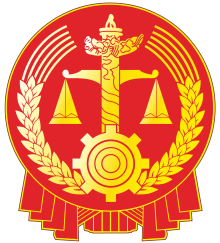
Back Gerichtsorganisation in der Volksrepublik China German Δικαστικό σύστημα της Κίνας Greek Système judiciaire en république populaire de Chine French Sistem peradilan Tiongkok ID 중화인민공화국의 사법 제도 Korean Çin yargı sistemi Turkish 中华人民共和国司法体制 Chinese
 |
|---|
|
|


The judicial branch, organized under the constitution and organic law, is one of five organs of state power elected by the National People's Congress (NPC), in the People's Republic of China. China does not have judicial independence or judicial review as the courts do not have authority beyond what is granted to them by the NPC under a system of unified power. The Chinese Communist Party's Central Political and Legal Affairs Commission maintains effective control over the court system and its personnel.[1][2] Hong Kong and Macau have separate court systems in accordance with the "one country, two systems" doctrine.
- ^ Ahl, Björn (2019-05-06). "Judicialization in authoritarian regimes: The expansion of powers of the Chinese Supreme People's Court". International Journal of Constitutional Law. 17 (1): 252–277. doi:10.1093/icon/moz003. ISSN 1474-2640.
- ^ ""Walking on Thin Ice" - Control, Intimidation and Harassment of Lawyers in China". Human Rights Watch. April 28, 2008. Retrieved June 19, 2024.
© MMXXIII Rich X Search. We shall prevail. All rights reserved. Rich X Search